Related Research Articles

Crystal River is a city in Citrus County, Florida, United States. The population was 3,396 in the 2020 census, up from 3,108 at the 2010 census. It is part of the Homosassa Springs, Florida Metropolitan Statistical Area. The city was incorporated in 1903 and is the self-professed "Home of the Manatee". Crystal River Preserve State Park is located nearby, and Crystal River Archaeological State Park is located in the city's northwest side.

Hardee County is a county located in the Florida Heartland of the Central Florida region in the U.S. state of Florida. As of the 2020 census, the population was 25,327. Its county seat is Wauchula.

Wayne County is a county located in the southeastern part of the U.S. state of Georgia. As of the 2020 census, the population was 30,144. The county seat is Jesup.

Jasper is a city and the county seat of Hamilton County, Florida, United States. The population was 4,546 at the 2020 census.
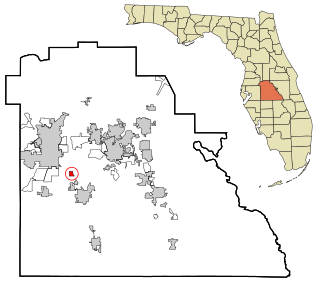
Highland City is a census-designated place (CDP) in Polk County, Florida, United States. The population was 2,051 at the 2000 census. It is part of the Lakeland–Winter Haven Metropolitan Statistical Area.

Mulberry is a city in Polk County, Florida, United States. It is part of the Lakeland–Winter Haven Metropolitan Statistical Area, with parts of unincorporated Lakeland on its northern boundary. The population was 3,952 at the 2020 census. Mulberry is home to the 334-acre Alafia River Reserve, and it is the headquarters to Badcock Home Furniture.

Ormond Beach is a city in Volusia County, Florida, United States. The population was 43,080 at the 2020 census. Ormond Beach lies directly north of Daytona Beach and is a principal city of the Deltona–Daytona Beach–Ormond Beach, FL Metropolitan Statistical Area. The city is known as the birthplace of speed, as early adopters of motorized cars flocked to its hard-packed beaches for yearlong entertainment, since paved roads were not yet commonplace. Ormond Beach lies in Central Eastern Florida.
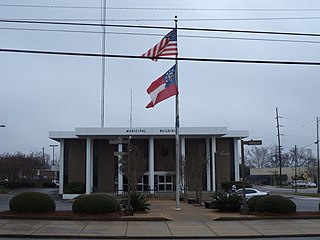
Moultrie is the county seat and largest city of Colquitt County, Georgia, United States. It is the third largest city in Southwest Georgia, behind Thomasville and Albany. As of the 2020 census, Moultrie's population was 14,638. It was originally known as Ochlockoney until it was incorporated by the Georgia General Assembly in 1859. Moultrie is an agricultural community set in the Southern Rivers part of Georgia.
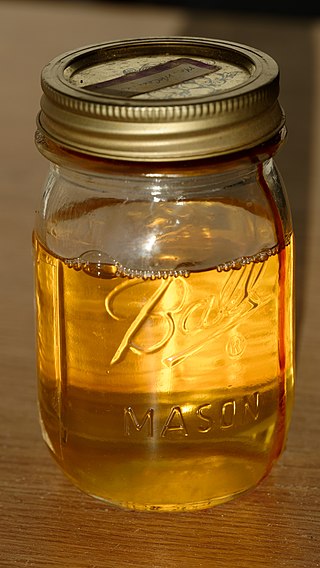
Turpentine is a fluid obtained by the distillation of resin harvested from living trees, mainly pines. Principally used as a specialized solvent, it is also a source of material for organic syntheses.

Weymouth Woods-Sandhills Nature Preserve is a North Carolina state park in Moore County, North Carolina in the United States. Located near Southern Pines, North Carolina, it covers 915 acres (3.70 km2) in the Sandhills region of the state.

Muscogee is a ghost town located twenty miles northwest of Pensacola, Florida, United States, in Escambia County, along the Perdido River. Named after the Muscogee Lumber Company, formed by Georgia lumber men, the town was founded in 1857 by a group of lumbermen to harvest timber from the surrounding pine forests. They and the following company clearcut the timber, and once the forests were gone, lumbering ended in this area.
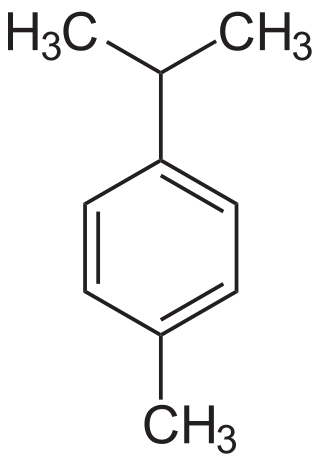
Naval stores are all liquid products derived from conifers. These materials include rosin, tall oil, pine oil, and terpentine. Crude gum or oleoresin can be collected from the wounds of living pine trees.

The naval stores industry produces and markets products derived from the oleoresin of pine trees, including rosin, tall oil, pine oil, and turpentine. It does this by collecting and processing organic forest products refined from slash pine and longleaf pine trees. The naval stores industry was associated with the maintenance of the wooden ships and sailing tackle of pre-20th century navies, which were caulked and waterproofed using the pitch of the pine tree.

Rosewood is an unincorporated community in Levy County, Florida, United States, located just off State Road 24, approximately 1 mile (1.6 km) northeast of Sumner and 9 miles (14 km) northeast of Cedar Key. An African-American community prospered there in the early 20th century, until a white mob destroyed it in the 1923 Rosewood massacre.
Sweetwater Ranch is an Unincorporated community in the southeast section of Hardee County, Florida, United States. Long/Lat: 27°24.6’ N and 81°42.2’ W Peak altitude is 82 feet, but the topography varies. Sweetwater is 15 minutes by car southeast of Zolfo Springs, Florida, and is bordered by U.S. 17 to the west, SR 66 to the North, and the unincorporated communities of Crewsville to the east and Fish Branch/Gardner to the South. It contains a significant portion of the Oak Creek watershed and borders on the Charley Creek watershed, both of which empty into Peace River. For many years, Sweetwater was the location of Hardee County's only lake, Lake Frances, which is privately owned. Sweetwater is only 15 minutes from Highlands Hammock State Park, and 20 minutes by car from Highlands County, and the city of Sebring, which offers regional shopping, recreational and medical centers.
Myakka City is an unincorporated community in southeastern Manatee County, Florida, United States. It lies along State Road 70 near the city of Bradenton, the county seat of Manatee County. Its elevation is 43 feet (13 m), and it is located at 27°20′59″N82°9′41″W. Although Myakka is unincorporated, it has a post office, with the ZIP code of 34251; the ZCTA for ZIP code 34251 had a population of 6,351 at the 2010 census. up from 4,239 in 2000.
Nalaka may refer to
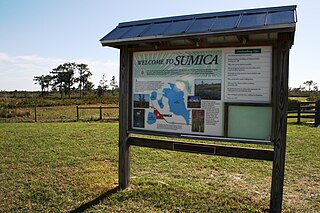
Sumica, alternatively written as SUMICA, was a mill town in Polk County, Florida, United States. The ghost town is commemorated by a historical marker off S.R. 60. There is also a Southwest Florida Water Management District preserve in the area named for the former logging settlement and mill town. Goods from a company store in the town could be purchased with company issued currency, including 25 cent and 5 cent scrip.
Kissimmee River Railway was an American single-track standard gauge steam rail line in Polk County, Florida stretching 7.26 miles from Walinwa to Nalaca, an area that developed with logging, sawmill, and turpentine industries. The rail line extended from the Seaboard Airline Railway branch line connecting Plant City and Walinwa. It also served the logging and mill town of Sumica and the turpentine settlement of Nalaka, Florida. Kissimmee River Railway was incorporated December 3, 1917. It was operated by the United States Railroad Administration.
Walinwa was a community by Lake Weohyakapka, Florida. The lake's name is translated as walk-in-water, and the settlement's name is a condensed form of those English words. Turpentine was produced in the area.
References
- ↑ "Mounds Reveal A Lost Trade Town. Turpentine Boom Created Town of Nalaca" . Retrieved 2019-06-15.
- ↑ "Ghost Towns of Highlands County, Florida" . Retrieved 2019-06-15.
- ↑ "Our History - Consolidated Tomoka Land Company" . Retrieved 2019-06-15.
- ↑ Ziel, Debora L. (2013). "Which Way to the Jook Joint?: Historical Archaeology of a Polk County, Florida Turpentine Camp". University of Central Florida. Retrieved 2017-12-28.
27°44′33″N81°18′30″W / 27.7424°N 81.3083°W